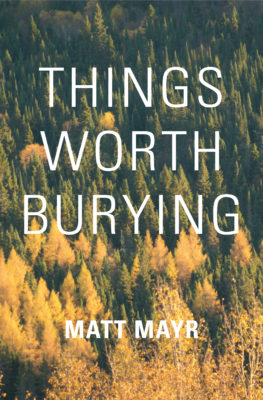Joe Adler, the narrator of Matt Mayr’s new novel Things Worth Burying, is a stand-up guy. If this sounds like an old-fashioned label, that’s because Joe’s an old-fashioned guy. A logger in a small Northern Ontario town, he’s spent his life set in his ways and stuck in one place. In this, as well as in his tendency to drink too much and anger too quickly, he’s like his father and grandfather before him. “I’ve never backed down from a challenge in my life,” he declares proudly, as if he were stating a credo.
Unfortunately, the challenge facing him as the novel opens can’t be settled with whiskey, fists, or pride. His wife has run off to take a creative writing workshop in Toronto, leaving Joe to take care of their seven-year-old daughter. (Oddly, he doesn’t dread the short story she’s certain to write about their marriage.) Suddenly, Joe’s self- proclaimed self-reliance has hit a wall. He’s not going to be able to manage on his own.
Before long, though, he meets Jenny Lacroix. A recent widow – her husband died working for Joe, and he feels some measure of guilt for the man’s accident – she helps Joe adjust to being a single parent. Jenny and Joe grow closer, which isn’t exactly unpredictable. Still, Mayr depicts this relationship with a touching mix of tentativeness and tenderness.
But it’s also a relationship that doesn’t go unnoticed in a gossipy small town. When Terry Pike, a coworker of Jenny’s late husband’s, confronts her about what he perceives, incorrectly, to be her infidelity, Joe is compelled to defend her honour as well as his own notion of what it means to be a man:
All I heard was the blood flowing in my ears, the rush of white noise, and I knew what I had to do. There was no choice, really. Either you’re a man and you stand up for yourself or you don’t…
Mayr fills us in on enough of Joe’s family history of violence – there are persistent rumours around town about his grandfather’s disappearance and his father’s suspected part in it – to make us believe Joe might have learned to recognize the consequences of this kind of inflexible, toxic masculinity. Only he doesn’t. A credo’s a credo, after all.

Things Worth Burying
Matt Mayr
Baraka Books
$24.95
paper
260pp
9781771862042
Mayr, who grew up in a small mining town in Northern Ontario before leaving to study creative writing in Toronto and pen a well-received first novel, Bad City, has a complicated affection for the world he left behind. He writes about the Canadian bush, in particular, with a profound awe for its beauty and a healthy respect for its dangers. He also sets up Things Worth Burying for a tragic outcome befitting a life and livelihood spent at the mercy of such an uncompromising landscape.
But this is also where Mayr’s attachment to his subject matter becomes a problem. At the same time that Joe’s doing what he always does, making things about as bad for himself as he possibly can, Mayr seems determined to let his protagonist off the hook – a bit too easily and often. Joe keeps telling us he’s become a better father and a better man – yes, there are more credos – but nothing that happens in the narrative rises to the level of supporting these declarations.
There’s a saving grace, though, and it’s in the novel’s recognition of how a rugged landscape requires not just the ruggedness but the resilience of the people who inhabit it. In the end, we care enough about Mayr’s characters, Joe especially, to wish them well and want them to do better. Things Worth Burying leaves us holding on to that hope. mRb






0 Comments